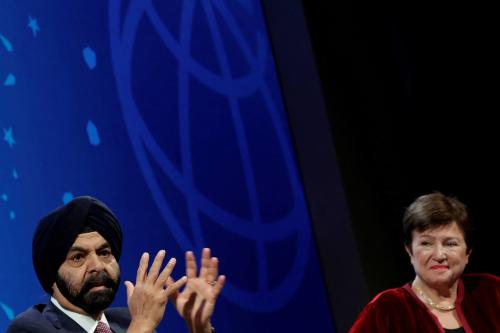Editor’s Note: Ralph Bryant lays out general principles for international cooperation in the supervision and regulation of financial activity in his companion piece “Prudential Oversight of Finance: First Principles for International Cooperation.”
Governments and central banks should act jointly to improve world standards for the prudential oversight of financial activity. And they should cooperate to monitor and enforce those standards.[1]
Two major underlying issues must be addressed before significant progress can be made toward those goals: Which international forums and institutions should be the locus of the cooperative efforts? How should important countries that heretofore have not been included in the existing cooperative efforts be brought into the process?
As of the autumn of 2008, a variety of international institutions and intergovernmental committees already address issues of prudential financial oversight. The most active have been committees or groups under the auspices of or associated with the Bank for International Settlements (BIS), especially the Basel Committee on Banking Supervision (BCBS). Supervision and regulation of securities and insurance have been discussed primarily in, respectively, the International Organization of Securities Commissions (IOSCO) and the International Association of Insurance Supervisors (IAIS). Cross-border accounting issues are the domain of the International Accounting Standards Board (IASB). The International Monetary Fund (IMF) and the World Bank have limited monitoring responsibilities in these areas. An umbrella organization created in 1999, the Financial Stability Forum (FSF), provides some oversight and coordination among the institutions and committees.
In recent years the combined international efforts fell well short of the cooperation that would have helped to mitigate today’s crisis. Nevertheless, the primary failures in prudential oversight were substantive rather than institutional.
Looking forward, some policymakers seem to yearn for a completely new institution. For example, some sweeping ideas in the air prior to the November 15th G-20 summit call for the creation of new “international colleges” to harmonize the supervision and regulation of the activities of the largest, internationally-active banks.
Some commentators pitch the ideas of a new “supranational regulator” or a complete re-design of the international architecture of financial regulation in a “Bretton Woods II” conference. These ideas, however, are vague and premature, if not naïve. Such staff expertise as now exists on prudential oversight of finance is lodged in national central banks and financial supervisory authorities, or to a small extent at the BIS, the IMF, and the World Bank. The staff and secretariat resources for a new supranational regulator or an international college of supervisors would in the shorter run have to be stolen from these institutions. How would a reshuffling of the existing inadequate expertise to a new institution lead quickly to better prudential oversight?
The allocation of responsibilities among the existing international institutions and committees is partly a haphazard result of historical events. It does not conform to an orderly blueprint. Even so, those who wish to create new institutions should be asked to explain why they believe the benefits would exceed the costs and why a tidier institutional structure would better foster cooperative prudential oversight of financial activity.
The relative roles of the BIS and the IMF are the most difficult institutional reform issue lurking beneath the surface. Some may argue that the IMF should be the center of gravity for cooperative prudential oversight for the longer run, and hence that it should gradually assume a dominant role in the global aspects of standard setting, data dissemination, and prudential monitoring. That view presumes that the BIS and committees such as the BCBS should play a declining and merely supporting role.
Sorting out the relative responsibilities of the IMF and the BIS involves much more than the functions of standards, data dissemination, and prudential supervision. Still more difficult is the issue of whether the IMF’s mandate should include primary responsibility for the surveillance of national monetary policies. Consensus exists that the IMF should appraise the monetary policy of an individual nation as an integral part of IMF surveillance during that nation’s Article IV consultations. But the central banks of the largest nations perceive the BIS rather than the IMF as the primary institutional conduit for cooperative consultations and surveillance of their monetary policies. When the major central banks have perceived a need for direct cooperation on issues of crisis management and lender-of-last-resort emergency lending, the BIS has also been their preferred venue.
The most delicate and fundamental issue at stake in defining relative responsibilities is the desirable degree of political independence for central banks. Because major central banks prize the BIS as their institution, they have not welcomed finance ministries inserting themselves into BIS activities. The IMF is often perceived as more beholden to finance ministries in national governments than to national central banks. Academic and public support for the political independence of central banks has waxed strong in recent decades.
Some single international organization may eventually come to be perceived as the principal locus for collective financial governance on a global scale—as a global central bank for national central banks. Today, one cannot perceive whether the IMF or the BIS is the more likely embryo for such an institution. It is equally unclear whether the IMF, if perceived as the embryonic world central financial institution, will have to be given greater political independence from national governments. An alternative line of speculation about the longer-run future is that the IMF and the BIS will both survive as powerful global financial institutions.
For the shorter run, the pragmatic choice may be to ask the Financial Stability Forum to serve as the main locus for coordinating decisions of the IMF, the BIS and associated committees, and the finance ministries, central banks, and supervisory agencies of national governments. At some point, however, the world community will have to formulate a clearer vision for the BIS and a refined mandate for the IMF in the areas of monetary policies and crisis management as well as financial standards, data dissemination, and prudential oversight. If both the IMF and the BIS plus its associated committees are to survive and prosper for the longer run, difficult decisions will have to be made — de facto if not transparently — about how to divide or share functional responsibilities between the two sets of institutions.
The issue of “Which Countries?” is closely related to “Which Institutions?” Some important countries and virtually all smaller countries have not so far been included in international decisionmaking about the prudential oversight of financial activity. In particular, China, India, Brazil, Mexico, and Korea have not had seats at the table when world standards and codes have been discussed.[2] Yet increasingly such countries are deeply engaged in the world financial system. Without greater voice in cooperative decisions, the excluded countries are unlikely to support the decisions.
China, India, Brazil and other emerging market economies do not attend meetings of the BCBS and other BIS-associated committees. Nor are they represented at meetings of the Financial Stability Forum. Indeed, the FSF was created after the Asian financial crises of 1997-1998 with the intent of including only the supervisory authorities and central banks of the main industrial countries.[3]
The summit on November 15th is formally a meeting of the G-20 and will thus include China, India, Brazil, Mexico, and Korea. Their participation on November 15th is an encouraging development. But when the discussion focuses on prudential financial oversight and when consideration is given to further activities of the FSF and the BCBS, will Europe, North America, and Japan propose that the big emerging-market countries be given a seat at those tables? It would be highly awkward to assert that countries such as China and Brazil should adhere to reformed world standards for prudential supervision and should cooperatively participate in reformed mechanisms for the management of financial crises without giving them a voice in the design of those standards and mechanisms.
Alternatively, do the major industrial countries wish to have expanded prudential oversight occur primarily through the IMF rather than through the FSF and BIS-associated groups? For that alternative, too, an awkward mismatch exists. China, India, Brazil, Mexico, and Korea have disproportionately small quotas and voting shares in the IMF while European countries have disproportionately large quotas and votes. The world community in the last three years went through a protracted negotiation to better adjust IMF quotas and votes to relative positions in the world economy. But the adjustments agreed in April 2008 were very modest and fell far short in addressing the challenges facing the IMF in its evolution toward a global institution with more balanced and inclusive representation and voting power. The April 2008 agreement failed completely in reducing the excessive number of seats held by European members in the IMF’s Executive Board (in fact, the issue was kept out of the negotiations altogether). The revised formula agreed in the negotiation for calculating the presumptive quota and voting shares of members, taken on its own, generated changes in shares that moved away from, rather than toward, a better alignment of voting power with economic realities. The agreement negotiated in April achieved its very modest improvements in raising the quotas and shares of countries such as China, India, Brazil, Mexico, and Korea only because the underlying formula was overridden with one-time, ad hoc gimmicks that masked the unpalatable consequences of the formula.[4]
Given the world financial crisis and the impetus in some quarters to “reform the international financial architecture,” a strong case exists for re-opening the negotiations about the governance of the IMF (and the World Bank). The United States Congress has not yet acted to pass the adjustments incorporated in the April 2008 IMF agreement (they had not even been submitted to Congress as of the summer of 2008). Given that President-elect Obama seems likely to adopt a more multilateralist approach that will strongly support international institutions, it would be better for the Congress not to act on them and instead encourage the Obama administration to re-start the negotiations, leading the way to a more solid and sustainable reform agreement.
Achieving a better agreement about the governance of the IMF and the World Bank – including a substantial increase in the quotas and voting shares of the emerging-market and developing countries – is, for a variety of reasons, an important task for the world community. That step forward is surely necessary if the IMF is to be given enhanced responsibility for catalyzing international cooperation about prudential financial oversight.
[1] These points are argued in a companion essay, “Prudential Oversight of Finance: First Principles for International Cooperation” (Brookings Institution, November 2008).
[2] Most countries in the world, of course, have not had seats at the table. Careful analysis should be concerned with how feasibly to incorporate the views of all countries.
[3] Singapore and Hong Kong are included in the FSF because, it was argued, they are “financial centers.” The FSF is formally independent of the BIS, but its small secretariat is lodged at the BIS.
[4] For further discussion, see my essay “Reform of IMF Quota Shares and Voting Shares: A Missed Opportunity” (April 2008).



